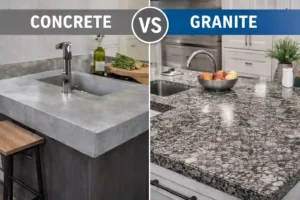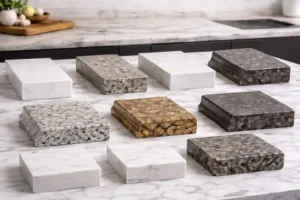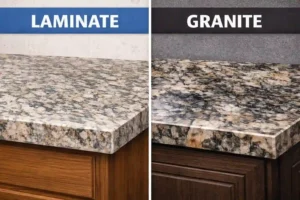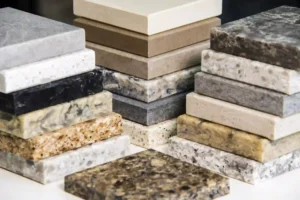Quartz countertops are a popular choice for modern kitchens and bathrooms. Their durability, elegance, and non-porous nature make them a low-maintenance option compared to natural stone surfaces. However, even quartz can develop stains over time. In this guide, we’ll cover everything you need to know about how to remove stains from quartz countertops, including prevention tips and when to seek professional help.
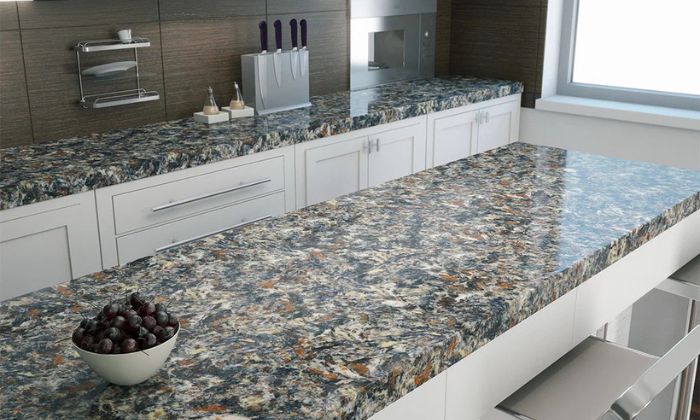
Table of Contents
ToggleUnderstanding Quartz Countertops
Quartz countertops are engineered surfaces made from natural quartz crystals combined with resins and pigments. They are non-porous, meaning liquids don’t easily penetrate them. However, improper care or exposure to certain substances can lead to stains on these otherwise resilient surfaces.
Common Types of Stains on Quartz Countertops
While quartz is resistant to staining, certain substances can leave marks if not addressed promptly. Let’s explore the most common types of stains:
Food Stains
Food stains on quartz surfaces often result from spills of coffee, tea, wine, or juices, which can leave behind unsightly discoloration if not cleaned promptly. Brightly colored foods like curry and tomato sauce are particularly notorious for causing stains due to their intense pigments. Quartz is engineered to be stain-resistant, but its protective surface can still temporarily absorb these vibrant substances, leading to visible marks. To avoid lasting stains, it’s essential to clean spills immediately using a gentle cleanser or soap and water. Proper care ensures your quartz surfaces remain spotless and maintain their pristine appearance over time.
Oil and Grease Stains
Oil and grease stains, often caused by cooking splashes, can accumulate over time and penetrate surfaces, making them difficult to remove. These stains are particularly stubborn because oil seeps into porous materials, such as stone countertops or fabric, leaving dark, sticky marks. Cleaning them requires targeted methods, such as blotting fresh stains with absorbent paper or using dish soap to break down the grease. For older stains, specialized degreasers or baking soda paste can help lift the residue. Preventing oil buildup with regular cleaning and the use of protective barriers can save you from dealing with these stubborn messes later.
Chemical Stains
Quartz countertops can be stained or damaged by harsh chemicals and acidic substances. Household cleaners containing bleach can cause discoloration, while acidic liquids like vinegar or lemon juice may dull the surface’s finish if not cleaned promptly. These substances can compromise the durability and appearance of quartz, which is otherwise a highly resilient material. To maintain its beauty and integrity, avoid using harsh chemical cleaners or exposing the surface to acidic substances for extended periods. Instead, opt for gentle, pH-neutral cleaners and wipe up spills quickly to protect your quartz countertops from potential damage.
Other Stains
Rust, paint, or ink stains are common challenges for various surfaces. Rust stains typically occur due to prolonged contact with metal objects, while paint and ink can leave stubborn marks from spills or mishandling. Each stain type requires a tailored approach for removal. Rust stains may need a poultice or a commercial rust remover. Paint stains can be lifted with a plastic scraper and a solvent, depending on the paint type. Ink stains often respond well to isopropyl alcohol or specialized cleaners. Timely treatment and proper cleaning techniques are crucial to restore the surface without causing damage.
How to Get Stains Out of Quartz Countertops
Removing stains from quartz countertops requires gentle yet effective methods. Let’s go step by step:
Blot the Stain: Act quickly. Use a soft cloth to blot, not rub, the stain. Rubbing can spread the stain or damage the surface.
Using Mild Detergent: For minor stains, mix warm water with a few drops of mild dish soap. Use a soft cloth or sponge to wipe the area clean. This method works well for fresh food stains or water stains.
Using the Baking Soda Method: For more stubborn stains, create a paste using equal parts baking soda and water. Apply the paste to the stain and let it sit for 5-10 minutes. Wipe it away with a damp cloth. This method is excellent for removing rust stains from quartz.
Using a Poultice From Baking Soda and Hydrogen Peroxide: For deeply embedded stains, mix baking soda with hydrogen peroxide to form a thick paste. Apply the poultice to the stain, cover it with plastic wrap, and leave it for 24 hours. Afterward, gently wipe away the residue with a clean cloth.
Preventing Future Stains
Prevention is always better than cure. Follow these tips to keep your quartz countertops stain-free:
Regular Cleaning: Wipe your countertops daily with warm water and mild soap. Regular cleaning quartz countertop practices help prevent the buildup of dirt or substances that could lead to stains.
Use Cutting Boards: Avoid direct contact between acidic or staining foods and your countertop. Always use cutting boards and trivets for preparation.
Avoid Harsh Chemicals: Stick to cleaning products specifically designed for quartz countertops. Avoid using bleach, ammonia, or other abrasive cleaners.
When to Seek Professional Help
If stubborn stains remain on your quartz countertop after trying all DIY methods, it’s time to seek professional help. Professionals are equipped with advanced tools and specialized cleaning agents designed to remove tough stains without harming the surface. They have the expertise to assess the type of stain and determine the safest, most effective removal techniques. This ensures your countertop’s durability and appearance are preserved. While hiring a professional may involve additional costs, it’s a worthwhile investment to protect your quartz countertop from further damage and restore its pristine look. Don’t hesitate to call an expert for the best results.
Quality and Expertise You Can Trust
Looking for expert Countertop Installation in Lowell? At SF Marble & Granite Inc., we specialize in high-quality countertop installation with a focus on precision and customer satisfaction. Whether you’re renovating your kitchen or bathroom, our team ensures a seamless, professional installation. Reach out today for a personalized consultation!
Conclusion
Quartz countertops are an excellent investment, offering style and durability. However, stains can occur if proper care isn’t taken. By following the steps outlined above, you can effectively tackle stains and maintain the beauty of your quartz surfaces. Remember to clean regularly, avoid harsh chemicals, and use protective measures to prevent future stains.
Whether it’s food stains, oil marks, or chemical discoloration, knowing how to remove stains from quartz countertops ensures your kitchen or bathroom remains stunning for years to come.
FAQs
1. Can quartz countertops stain?
Yes, while quartz countertops are non-porous and generally resistant to stains, they can still stain if spills are not cleaned up promptly. Substances like coffee, wine, and oily foods can cause stains if left untreated.
2. How do you remove food stains from quartz countertops?
To remove food stains, gently blot the area with a soft cloth, then clean the stain with a mild dish soap solution. For tougher stains, you can use a paste of baking soda and water or try the poultice method with hydrogen peroxide.
3. Can you use vinegar on quartz countertops?
No, it’s best to avoid using vinegar or other acidic substances on quartz countertops, as they can dull the surface and cause damage. Stick to pH-neutral cleaners instead.
4. How do you remove oil and grease stains from quartz?
Blot fresh oil or grease stains with absorbent paper, then clean with dish soap. For older stains, you can try a baking soda paste or a specialized degreaser to lift the residue.
5. How can I prevent stains on my quartz countertops?
To prevent stains, clean up spills immediately, avoid using harsh chemicals, and use cutting boards for food preparation. Regular cleaning with mild soap and water helps maintain the surface’s protective layer.
6. When should I contact a professional for quartz countertop stains?
If stains persist despite cleaning efforts or if you’re unsure about the best method for removal, it’s time to contact a professional. They have the right tools and expertise to safely remove tough stains and preserve your countertop’s appearance.
7. Are quartz countertops easy to maintain?
Yes, quartz countertops are relatively low-maintenance compared to natural stone surfaces. Regular cleaning and avoiding harsh chemicals will keep them looking beautiful for years.

